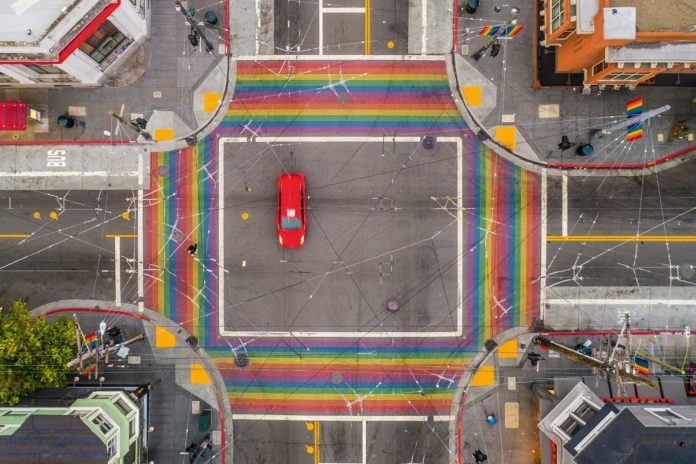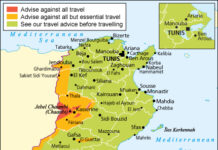
Walking the walk
While it’s understandable that travellers may not want to go somewhere they can’t be themselves, Tanzella points out that scores of destinations are off-limits as a result. “A lot of nations that have progressive laws today had very different laws a decade ago,” he says, encouraging travellers to do their research before travel but not to dismiss destinations altogether purely based on politics.
Any legislative change begins at the top, of course, but certain governments pose a challenge for the industry. In these cases, companies looking to directly advertise to gay, lesbian or trans travellers can rarely do so overtly. Burn argues that such destinations — which often happily take bookings from LGBTQ+ travellers — need to put their money where their mouth is. “A lot of them rely on the money of these travellers, but are they making inroads with getting laws changed?” he asks. “It’s not fair to have one rule for citizens and another for visitors.”
Despite this, there’s been tentative progress in countries that, until recently, lagged well behind in terms of equality.
In 2019, the Botswana High Court ruled in favour of decriminalising homosexuality, and similar moves have been made in the Seychelles, Mozambique and Trinidad and Tobago in recent years. Change takes time, says Cruse, claiming that some destinations, such as the Bahamas, were hesitant about welcoming a lesbian cruise in the early 1990s. “Once we [the company] came into the market, people got to know us and realised we were no different, things started to change.”
If government support isn’t always a given, then how else to improve the landscape for LGBTQ+ travellers? Mayle believes it isn’t too late for companies looking to make a positive change, but the key is doing it with purpose and authenticity. Tanzella agrees, saying that lip service is no longer enough to convince travellers that the industry cares. “If you claim to appreciate diversity, but your board of directors looks the same, you’re not walking the walk,” he says. “You need to really mean what you’re doing.”
Streff says travellers today are savvy, and that a rainbow sticker in the window is no bad thing but needs to go much further. “Diversity is something that needs to be reflected behind the scenes, too, so consumers know it’s genuine,” he says.
Authenticity has worked for Madrid, at least. Of course, there are rainbow flags and stickers aplenty, but it’s the progress that counts most: this is the capital of a country where same-sex marriage was legalised nationwide in 2005 — the third country in the world to do so after the Netherlands and Belgium. Perhaps it’s proof that if you show the world you’re open-minded, people will come.
Other nations might want to take note: after all, where LGBTQ+ travellers go, others follow. “It happened with Ibiza, and now we’re seeing it with Mykonos — suddenly everyone’s going,” says Burn. “It’s almost a question of ‘where will the gays go next?’”
Five cities to watch
Brighton & Hove
It’s almost been three, pandemic-beleaguered years since the city last hosted a Pride event, but this summer sees the return of the country’s biggest (and arguably best) Pride celebration. A weekend chock-full of concerts, parades, street parties, cabaret and even a dog show will make up the delayed 30th anniversary celebrations. 5-7 August.
Belgrade
While attitudes in Serbia remain mixed, laws have improved considerably over the past decade. Openly gay prime minister Ana Brnabić took office in 2016, and this year the city will host Europride, the continent’s biggest Pride festival. Previous events in the city have faced intense hostility, so this is a watershed moment for the country’s LGBTQ+ community. 12-18 September.
Toronto
In December, Canada followed the likes of Brazil, Germany and Malta in banning the controversial practice of conversion therapy — another sign of the country’s progressive stance on equality. Multicultural Toronto is the nexus of the country’s LGBTQ+ scene — set to come alive for a month of eclectic Pride celebrations in June.
Valletta
Malta topped the ILGA-Europe Rainbow Index for a sixth consecutive year in 2021. The metric analyses the equality policies of 49 European countries and found that open-minded Malta is streets ahead of many of its neighbours, with recent amendments including an updated policy for LGBTQ+ refugee claims.
Sydney
The cosmopolitan Australian city takes up the mantle as host of World Pride in February 2023. This will be the first time the event has been held in the Southern Hemisphere, so expect a celebratory 17- day programme of Pride marches, beach parties, conferences and a First Nations gala concert. 17 February to 5 March 2023.
Published in the April 2022 issue of National Geographic Traveller (UK)
Follow us on social media








